Dow 10,000 Stock Market Euphoria May be Shortlived
Stock-Markets / Financial Markets 2009 Oct 16, 2009 - 06:58 PM GMT U.S. Michigan Sentiment Index Decreased to 69.4. - Confidence among U.S. consumers fell more than forecast in October, a reminder that households remain nervous about the strength of the emerging economic recovery. The Reuters/University of Michigan preliminary index of consumer sentiment decreased to 69.4 from 73.5 in September, which was the highest in more than a year. Measures of expectations for six months ahead and current conditions both fell. The index averaged 87.3 in 12 months leading to December 2007, when the recession began.
U.S. Michigan Sentiment Index Decreased to 69.4. - Confidence among U.S. consumers fell more than forecast in October, a reminder that households remain nervous about the strength of the emerging economic recovery. The Reuters/University of Michigan preliminary index of consumer sentiment decreased to 69.4 from 73.5 in September, which was the highest in more than a year. Measures of expectations for six months ahead and current conditions both fell. The index averaged 87.3 in 12 months leading to December 2007, when the recession began.
Earnings season is here.
General Electric Co.’s third-quarter profit declined 45 percent as the company scaled back real estate and consumer lending and sold fewer medical machines, leading to a steeper drop in sales than analysts projected. As GE goes, so does the rest of this country.
Bank of America Corp., the biggest U.S. lender, posted its second quarterly loss in less than a year, unable to shake off effects of the economic contraction that drove the company to take two taxpayer bailouts. “The idea that the financial crisis is over is a fantasy and it looks like the numbers bear that out,” said Harvard University professor Niall Ferguson on Bloomberg Television. “It’s clearly not over for Bank of America.”
Art Cashin: "This Is Going To Be A Long, Hard Slog”
"Yesterday was a good day for bulls and a great day for hat makers." And on the 10,000 cross: "there was some artificially induced euphoria... It's only about the 29th time we've crossed 10,000 so it's not that significant - we did it 10 years ago." And on the most important issue: "The economy is just not living up to these numbers."
Steep decline ahead?
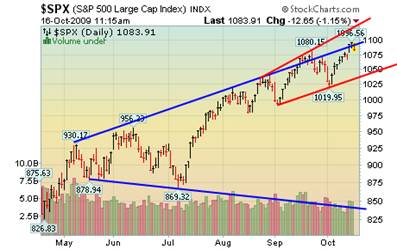 --One of the unique aspects of this bear market rally is that, starting in August, a national liquidity squeeze has been turned against short sellers. Many large brokerage houses refuse to lend shares or even offer inverse exchange traded funds. This has resulted in one of the largest drops in short interest, now at its lowest level since early 2007. Decreased short interest means there is reduced buying power under the market, should it decline. That implies a steeper decline than normal mat be just ahead.
--One of the unique aspects of this bear market rally is that, starting in August, a national liquidity squeeze has been turned against short sellers. Many large brokerage houses refuse to lend shares or even offer inverse exchange traded funds. This has resulted in one of the largest drops in short interest, now at its lowest level since early 2007. Decreased short interest means there is reduced buying power under the market, should it decline. That implies a steeper decline than normal mat be just ahead.
Treasuries bounce after a tough week.
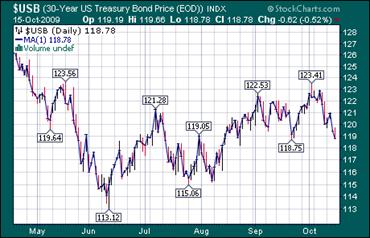 -- Treasury 30-year bonds gained for the first time in three days as investors sought higher returns amid signs the economy is recovering without an acceleration in inflation. The difference in yields between two- and 10-year notes narrowed by 0.04 percentage point to 2.47 percentage points, the first flattening of the yield curve in four days. A Treasury report showed today that international investors accumulated Treasuries in August for third straight month.
-- Treasury 30-year bonds gained for the first time in three days as investors sought higher returns amid signs the economy is recovering without an acceleration in inflation. The difference in yields between two- and 10-year notes narrowed by 0.04 percentage point to 2.47 percentage points, the first flattening of the yield curve in four days. A Treasury report showed today that international investors accumulated Treasuries in August for third straight month.
Could this be the end of the gold rally?
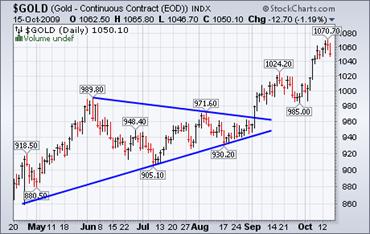 --Gold fell in New York and London as some investors took advantage of a rebounding dollar to lock in gains from the precious metal’s rally to a record. Bullion yesterday dropped the most in three weeks, and is heading for the first weekly decline in October. The U.S. Dollar Index, a six-currency gauge of the greenback’s value, gained as much as 0.6 percent today, ending a four-day decline.
--Gold fell in New York and London as some investors took advantage of a rebounding dollar to lock in gains from the precious metal’s rally to a record. Bullion yesterday dropped the most in three weeks, and is heading for the first weekly decline in October. The U.S. Dollar Index, a six-currency gauge of the greenback’s value, gained as much as 0.6 percent today, ending a four-day decline.
Will the Nikkei continue its rally?
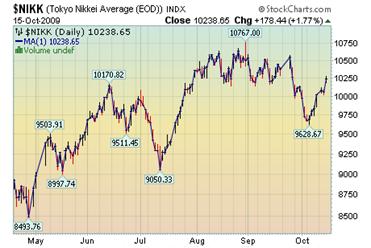 - Japanese stocks (Nikkei 225 Stock Average) added 0.2 percent to 10,257.56 at the close of trading in Tokyo, after swinging between gains and losses in the afternoon. The broader Topix fell 0.4 percent to 900.95, with about three stocks retreating for every two that climbed. For the week, the Nikkei rose 2.4 percent and the Topix climbed 0.3 percent.
- Japanese stocks (Nikkei 225 Stock Average) added 0.2 percent to 10,257.56 at the close of trading in Tokyo, after swinging between gains and losses in the afternoon. The broader Topix fell 0.4 percent to 900.95, with about three stocks retreating for every two that climbed. For the week, the Nikkei rose 2.4 percent and the Topix climbed 0.3 percent.
Is China’s recovery tracking the market?
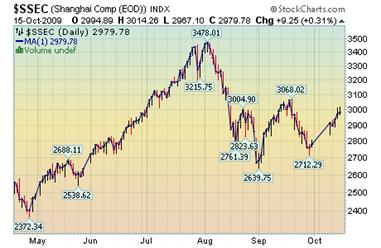 -- The Shanghai index fell, paring a weekly gain by the benchmark index, as banks retreated after the regulator told them to increase write-offs against bad loans. The Shanghai Composite Index lost 3.16, or 0.1 percent, to 2,976.63 at the close. About nine stocks fell for every eight that gained. The gauge advanced 2.2 percent this week on signs the nation’s economic recovery is accelerating.
-- The Shanghai index fell, paring a weekly gain by the benchmark index, as banks retreated after the regulator told them to increase write-offs against bad loans. The Shanghai Composite Index lost 3.16, or 0.1 percent, to 2,976.63 at the close. About nine stocks fell for every eight that gained. The gauge advanced 2.2 percent this week on signs the nation’s economic recovery is accelerating.
The dollar bounces from the bottom.
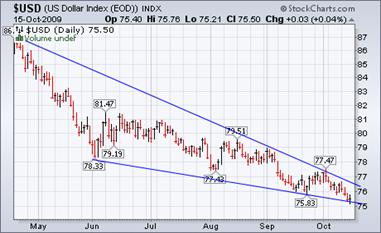 The dollar snapped a four-day losing streak against the euro, rising from a 14-month low, as some investors bet that the currency’s decline was overstated given signs of a U.S. economic recovery. “The U.S. dollar is trading better on better news now,” said Adam Cole, head of global currency strategy at RBC Capital Markets in London. “At the same time we have ECB speakers stepping up their concern on the dollar’s weakness and that could likely stop the drop in dollar-euro.”
The dollar snapped a four-day losing streak against the euro, rising from a 14-month low, as some investors bet that the currency’s decline was overstated given signs of a U.S. economic recovery. “The U.S. dollar is trading better on better news now,” said Adam Cole, head of global currency strategy at RBC Capital Markets in London. “At the same time we have ECB speakers stepping up their concern on the dollar’s weakness and that could likely stop the drop in dollar-euro.”
Foreclosures: 'Worst three months of all time'.
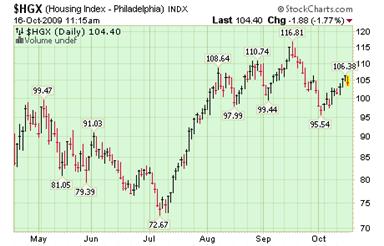 -- Despite concerted government-led and lender-supported efforts to prevent foreclosures, the number of filings hit a record high in the third quarter, according to a report issued Thursday. "They were the worst three months of all time," said Rick Sharga, spokesman for RealtyTrac. During that time, 937,840 homes received a foreclosure letter -- whether a default notice, auction notice or bank repossession. That means one in every 136 U.S. homes were in foreclosure, which is a 5% increase from the second quarter and a 23% jump over the third quarter of 2008. So why are housing stocks going up?
-- Despite concerted government-led and lender-supported efforts to prevent foreclosures, the number of filings hit a record high in the third quarter, according to a report issued Thursday. "They were the worst three months of all time," said Rick Sharga, spokesman for RealtyTrac. During that time, 937,840 homes received a foreclosure letter -- whether a default notice, auction notice or bank repossession. That means one in every 136 U.S. homes were in foreclosure, which is a 5% increase from the second quarter and a 23% jump over the third quarter of 2008. So why are housing stocks going up?
A perfect storm is brewing to cool petroleum demand .
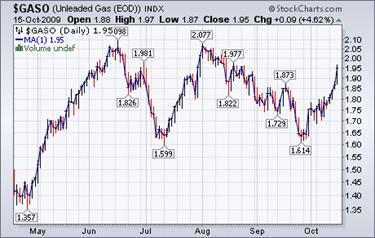 A perfect storm of influences is having a lasting effect on the world's petroleum markets and there's nothing on the horizon to sway its path. With high oil and fuel prices, a weak global economy and worldwide government and consumer efforts to increase conservation and efficiency, some analysts doubt a return to the peak energy consumption levels seen just a few years ago. Consumers are forced to cut down on costs, including energy consumption, and in doing that, they may find a more permanent solution for their energy needs.
A perfect storm of influences is having a lasting effect on the world's petroleum markets and there's nothing on the horizon to sway its path. With high oil and fuel prices, a weak global economy and worldwide government and consumer efforts to increase conservation and efficiency, some analysts doubt a return to the peak energy consumption levels seen just a few years ago. Consumers are forced to cut down on costs, including energy consumption, and in doing that, they may find a more permanent solution for their energy needs.
Weather may affect natural gas prices for a season.
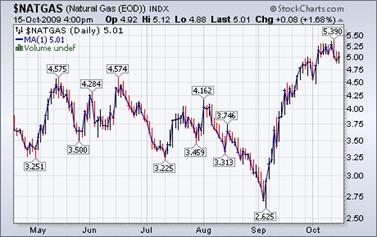 The Energy Information Agency’s Natural Gas Weekly Update reports, “Price increases occurred at nearly all markets as temperatures fell in the eastern half of the country, boosting demand for natural gas as a space-heating fuel, as well as consumption of natural gas by electric power producers meeting increased requirements for electric-powered heating.”
The Energy Information Agency’s Natural Gas Weekly Update reports, “Price increases occurred at nearly all markets as temperatures fell in the eastern half of the country, boosting demand for natural gas as a space-heating fuel, as well as consumption of natural gas by electric power producers meeting increased requirements for electric-powered heating.”
Dow Breaks 10,000: Don't Get Caught Up in "Euphoria", Mish Warns
The Dow Jones Industrial Average closed above 10,000 today for the first time in a year, and more than a decade after first breaking the mark. Since hitting lows in March, the Dow is up an astounding 50%, while the S&P 500 has gained 60%.
Before you get your broker on the phone or start trading that dormant online brokerage account, take heed of this warning from Mike “Mish” Shedlock, the blogger behind MISH'S Global Economic Trend Analysis: "Five years from now, I think it’s quite likely the Dow is not going to be much more than 10,000," he says.
Why so negative? "We've still not solved any of those structural problems" in the housing, banking and debt markets, that caused last year's crisis, he claims. Shedlock's advice: ignore the euphoria, and "take some chips off the table. Now's just not a good time to be invested."
On October 9, 1930…
Market wrap: Concerns that recent stock declines have weakened banks with high levels of loans on securities called absurd by “responsible New York banking circles”; most country banks reportedly more concerned with employing surplus funds than with their liquidity. While it's true security loans are close to record level, liquid assets are so enormous that freezing even a large number of security loans wouldn't imperil banks positions; banks also have large capacity to borrow from Fed.
Our Investment Advisor Registration is on the Web
We are in the process of updating our website at www.thepracticalinvestor.com to have more information on our services. Log on and click on Advisor Registration to get more details.
If you are a client or wish to become one, please make an appointment to discuss our investment strategies by calling Connie or Tony at (517) 699-1554, ext 10 or 11. Or e-mail us at tpi@thepracticalinvestor.com .
Anthony M. Cherniawski,
President and CIO
http://www.thepracticalinvestor.com
As a State Registered Investment Advisor, The Practical Investor (TPI) manages private client investment portfolios using a proprietary investment strategy created by Chief Investment Officer Tony Cherniawski. Throughout 2000-01, when many investors felt the pain of double digit market losses, TPI successfully navigated the choppy investment waters, creating a profit for our private investment clients. With a focus on preserving assets and capitalizing on opportunities, TPI clients benefited greatly from the TPI strategies, allowing them to stay on track with their life goals
Disclaimer: The content in this article is written for educational and informational purposes only. There is no offer or recommendation to buy or sell any security and no information contained here should be interpreted or construed as investment advice. Do you own due diligence as the information in this article is the opinion of Anthony M. Cherniawski and subject to change without notice.
Anthony M. Cherniawski Archive |
© 2005-2022 http://www.MarketOracle.co.uk - The Market Oracle is a FREE Daily Financial Markets Analysis & Forecasting online publication.



